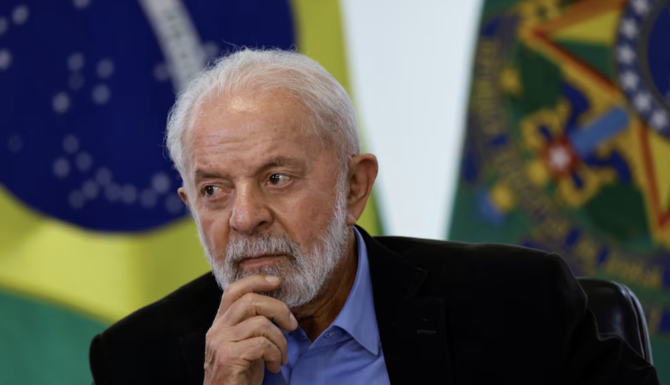Andrew Hammond
Since the war in Ukraine began, the G20 is widely considered to have been diminished in terms of its effectiveness, as a result of growing global geopolitical divisions. Nonetheless, Brazil, which holds the presidency of the organization this year, has been promoting an expansive, ambitious agenda, some elements of which will be hard to deliver.
Brazil’s G20 leadership year began in December and so is already almost four months old. One of the most ambitious proposals so far from President Luiz Inacio Lula da Silva is the reform of postwar multilateral institutions, including the UN, the International Monetary Fund, the World Trade Organization, and the World Bank. Lula’s argument is that the changing balance of global power, as well as the proliferation of conflicts around the world, means such a shift in the multilateral order is increasingly necessary.
However, such reforms have been discussed for at least three decades and will prove far from easy to deliver. While a growing number of countries agree on the case for change in principle, forging a consensus around specific proposals in practice is difficult.
For instance, one of Brazil’s ideas for reform of the UN is that the P5, the five permanent members of the Security Council (the US, China, Russia, France, and the UK), relinquish their power of veto if an issue under debate affects them directly. Presumably this would apply to Russia, for example, in decisions related to Ukraine.
This specific proposal is unlikely to receive the backing of the P5. One of the reasons why building a consensus behind this, or any other agenda for reform, is so hard is because the permanent members have long been reluctant to embrace change and are increasingly divided geopolitically.
Nonetheless, Lula is pushing this agenda hard. The goal is to assemble a meeting of G20 leaders, and a broader collection of ministers, in New York City during the UN General Assembly in September to try to agree on a plan of action for moving forward.
Another distinctive way in which Brazil is using its leadership of the G20 is by focusing on the sustainability agenda. This spans multiple dimensions of sustainable development, including economic, social and environmental, and includes the fight against hunger and poverty.
One key reason for the increased focus on food security is a gathering storm, including the effects of the war in Ukraine, that the former director of the UN’s World Food Programme, David Beasley, said is fueling a global hunger catastrophe.
Brazil sees itself as a genuine “agri-superpower” that can serve as a breadbasket for much of the rest of the world. Since authorities in the country made major investments in the sector in the 1970s, Brazil has become the world’s second largest exporter of agricultural products, specializing in produce such as meat, coffee and corn. Such has been its success, several large economies now rely heavily on Brazil to deliver many of their food needs. During his country’s presidency of the G20, Lula will formally announce Brazil’s intention to launch a Global Alliance Against Hunger and Poverty.
These are just two of the platforms that form part of Brazil’s ongoing G20 summitry, which includes dozens of meetings involving ministers, other officials, and representatives of civil society from around the world.
The pinnacle of all this will be a leadership summit in Rio de Janeiro in November attended by about 30 heads of state and government from G20 member states and invited guest nations, plus top officials from international organizations such as the UN, the World Health Organization, the World Bank and the IMF.
The biggest single challenge Lula faces as he attempts to ensure a successful year of G20 summitry is the geopolitical divisions that have grown since the start of the war in Ukraine. During recent G20s, tensions have run high over Moscow’s invasion, and have resulted in diplomatic fireworks.
In 2022 and 2023, G20 foreign ministers clashed repeatedly, with Russia’s Sergey Lavrov walking out of some meetings, and there were none of the customary group photographs of the so-called “G20 family.” With Ukraine continuing to prove so divisive, huge barriers remain to constructive discussion this year.
It is not only the conflict in Ukraine that is creating challenges, however. Tensions have long run high, too, between China and the West.
In this context of uncertainty, Lula is trying to make his mark as host of the G20. He has been helped in his efforts by recent supportive noises from Chinese President Xi Jinping, who said that he and US President Joe Biden must find ways to get along better in the face of the longstanding chill in bilateral ties.
Part of the reason Lula is so keen to chair proceedings and leverage his country’s presidency of the G20 is the prestige the group still enjoys, despite the widening geopolitical divisions. Presidents and prime ministers from China, Germany, India, Japan, Australia, Brazil, the UK, Saudi Arabia, South Africa, Turkey, France, Italy, Germany, Canada, South Korea, Argentina, Mexico, the EU, the US, and Russia will be in attendance at the leadership summit. Collectively, these powers account for about 90 percent of global gross domestic product, 80 percent of world trade and about 66 percent of the global population.
Lula is well aware that in the past decade and a half, while the G20 is widely seen to have seized the mantle from the G7 as the premier forum for international economic cooperation and global governance, it has failed so far to realize the full scale of the ambition some have thrust upon it.
In part, this is because it has no formal mechanisms to ensure enforcement of agreements reached by world leaders.
All of this highlights why 2024 is proving to be one of the most unpredictable years for the G20. While there is an outside chance it could all collapse into rancor, there is a greater possibility that significant agreements could be reached, building on the summitry that has taken place over the past four months.
Amid the uncertainty, what is certain is that the Brazilian presidency will continue to work to exceed the expectations placed upon it. Whether it succeeds in this will depend, for the most part, on whether the post-Ukraine divisions between the West and Russia continue to grow in the months ahead.







